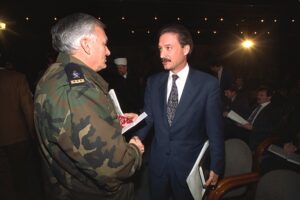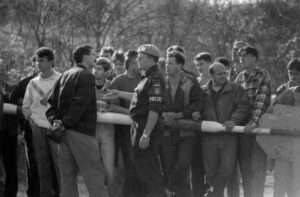The directive from the U.S. ambassador to Croatia set off alarm bells at the CIA. Peter Galbraith wanted his station chief to confirm for Croatian intelligence that the United States did not object to Iran establishing an arms pipeline to the Muslim-led government of neighboring Bosnia-Herzegovina.
Just days earlier President Clinton had restated official U.S. policy of respecting, though disagreeing with, the international arms embargo on former Yugoslavia. Confused, the station chief asked headquarters if there had been a policy change. The answer came back no.
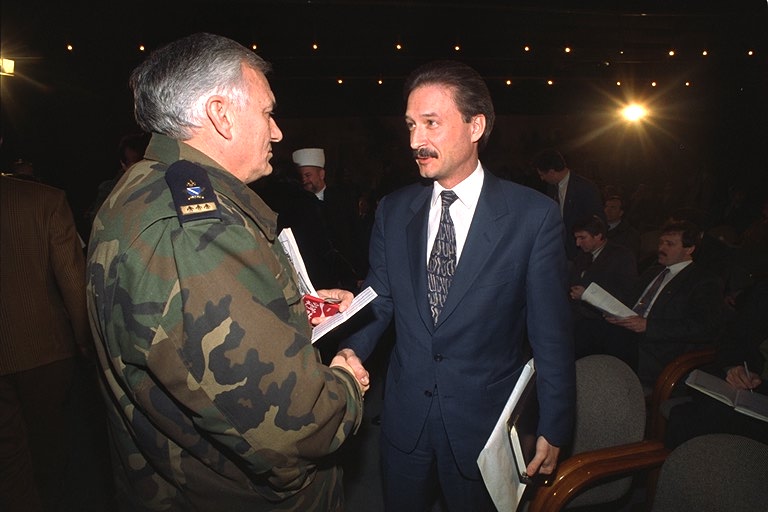
So began the most curious chapter in the muddled history of U.S. attempts to end Europe’s worst bloodletting since World War II. Fearing both leaks and objections, senior National Security Council and State Department officials did not tell their CIA and Pentagon counterparts in April 1994 of the decision to let Iran arm the Bosnians. That led to a fittingly Balkanized bureaucracy in which CIA officials, fearing another Iran-Contra scandal in the making, kept tabs on Galbraith, while Washington’s ambassador to Bosnia was left in the dark.
“We weren’t generating gutsy policy,” said one frustrated State Department official. “We did this to buy a little more time, so we didn’t have to step into a leadership role. We were even willing to let the Iranians inthat’s the tragedy here.”
Unwilling to arm Bosnia directly for fear that would collapse the Atlantic alliance and land U.S. troops in the middle of a Balkan mess, yet convinced military pressure on the Serbs was the only way to halt the fighting, the proposal to allow Iran to arm Bosnia via Croatia ensured weapons would reach the flailing Sarajevo government without American “fingerprints.”
But the decision has come to haunt the Clinton administration. A continued Iranian presence in Bosnia threatens American troops and hampers U.S. efforts to strengthen a Muslim-Croat federation. Many Bosnians feel betrayed by the United States and view Iran as the steadfast ally. Iran’s influence in Sarajevo has given ammunition to opponents of Bosnian unity, especially Serb and Croat extremists. And revelations that Washington effectively helped circumvent the arms embargo has undermined U.S. credibility with European allies and undercut Washington’s arguments that Europe should support other embargoes, like those against Cuba and Iraq.
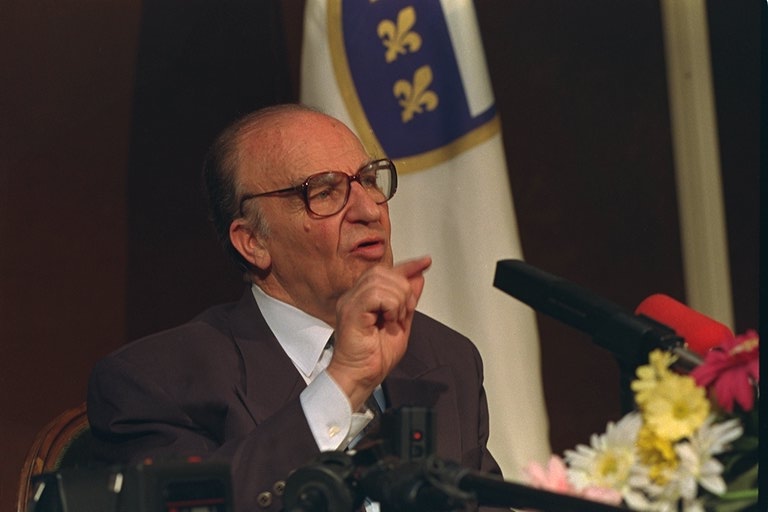
In Washington, news of the policy turnaround on both the arms embargo and Iran, still officially isolated as a terrorist state, has led to a series of hearings and a formal inquiry. Senior administration officials have testified before Congress – which long sought to lift the arms embargo overtly – that the United States merely stood mute when the Croatians sought permission to allow, for a price, the transit of Iranian arms to Bosnia. But they are suspected of having played a much more active role, including meeting with Iranian intermediaries, maintaining oversight of the weapons flow and promising a secret arms operation, which won concessions from the Bosnian government on the arms embargo debate. Government sources familiar with the inquiry into the Iran-Bosnia affair believe a criminal investigation is needed to see if some administration officials lied to Congress and whether their activity was an illegal secret operation.
“This was a foreign policy blunder If they wanted to get arms to the Bosnians, they should have been forceful with the Allies and used the tool they had, which was covert action,” said an intelligence source, who refused to be named. “What they did was talk like a superpower and act like a wimp, and to me that was a very bad foreign policy decision. But was it illegal? No, I don’t think so. Was it a covert action? No, I don’t think so.”
Balkan policy-makers long believed the key to ending the war in former Yugoslavia lay with the Croats, the second-most powerful force behind the Serbs. So there was no attempt to block secret Iranian-Croatian negotiations in October 1993 on supplying the Croats with weapons. The arms were needed to retake rebel Serb-held land, in exchange for Zagreb funnelling Iranian weapons to the Bosnians next door.
Nothing was said publicly of the deal between the two ideologically opposed governments, one radical Islamic, the other rigidly Roman Catholic, even though a year earlier the United States ordered the Croats to turn back an Iranian jumbo jet loaded with weapons that landed in Zagreb.
Because the Iranians distrusted the Croats, whose proxies in Bosnia had been at war with the mostly Muslim government army since March 1993, they made the arms deal contingent on guarantees that weapons would reach Bosnia’s Muslim fighters, U.S. government sources said.
In September 1993, Galbraith hosted private, informal talks at his home between the Croatian foreign minister and the Bosnian prime minister, in an attempt to end Bosnia’s Muslim-Croat fighting. Two months later, the Croatian foreign minister began the official rapprochement in a visit to Sarajevo.
By March 1994, American diplomats had concluded negotiations to form a federation of Bosnian Muslims and Croats that halted the war-within-a-war and secured two strategic objectives: unifying, theoretically at least, the anti-Serb forces in Bosnia and reopening a weapons smuggling route from Croatia.
A month later, the United States formally indicated to the Croatian government it would not object if Iranian arms were funnelled to the Bosnians. That decision became known as the “no instructions” policy, a diplomatic twist of logic in which the absence of ‘no’ meant ‘yes.’
A senior Clinton administration official, speaking on condition he not be named, acknowledged the United States took no action when it learned of the 1993 Iran-Croatia dealings. “It was consistent with what we did with the ‘no instructions.’ We kind of took a passive, hands-off approach given our view that the arms embargo was unfair,” the official said. “Even though we had strong reservations about anybody getting into bed with the Iranians, in the context of the Balkan conflict we decided not to obstruct it, not to try to undo the deal. That was similarly our assessment with the ‘no instructions,’ even though the Iranians were going to be the main supplier.”
State Department documents, some of which were obtained only under threat of congressional subpoena, and CIA memos suggest Galbraith was more instrumental in the arms transfers than he has admitted, government sources familiar with the investigation said. Investigators also suspect a link between the 1993 Iran-Croatia arms deal and Washington’s decision a few months later, at Galbraith’s urging, not to block Iranian arms to the Bosnians.
Galbraith developed a close relationship with Croatian Defense Minister Gojko Susak after taking up his post in June 1993, and the two met regularly, including over meals at the ambassador’s home. Susak was anxious to get sophisticated weapons the Iranians could provide, especially surface-to-surface missiles that could hit Serbia. One-third of Croatia was still in Serb hands following the 1991 war of secession from Serb-dominated Yugoslavia, and Zagreb’s patience with U.N. mediation was over. Additionally, shipments to the Bosnians that passed through Croatia could be screened to keep out strategic weapons, in case of a future Muslim-Croat war.
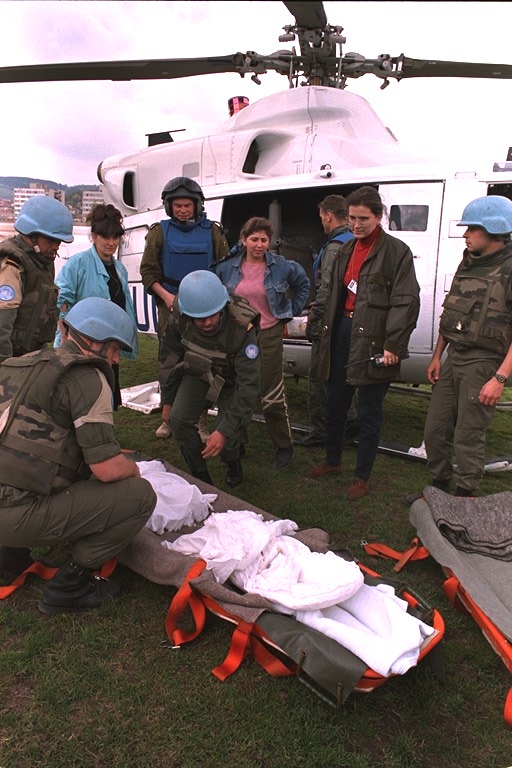
Croatia was under the same U.N. arms embargo that handicapped Bosnia, but the ban gave the country in which weapons arrived responsibility for enforcing it. More significantly, Croatia was not under a NATO-enforced “no fly zone” as was Bosnia, and therefore could receive weapons by air.
In contrast to Susak, Croatian President Franjo Tudjman, a nationalist Roman Catholic who stridently opposes Islam, was more hesitant about the Iranian pipeline and wanted assurances that Washington, whose approval in general he coveted, would not object.
So on April 29, 1994, Galbraith gave Tudjman the “no instructions” message. When the Croatian president did not understand, Galbraith testified he added, “pay attention to what I did not say.” Galbraith’s counterpart on federation issues, special Ambassador Charles Redman, explained further that the United States “did not want to be put in a position of saying no.”
In testimony last May before the House International Relations Committee, Galbraith acknowledged the message “was intended to tell them that we were not objecting.” However, he denied that U.S. officials hatched the plan or did anything to encourage or facilitate weapons shipments from Iran to Bosnia.
But in a cable to Secretary of State Warren Christopher on April 27, 1994, before the first of two meetings with Tudjman on the issue, Galbraith urged approval of an answer “that indirectly signaled that we will not not object if Croatia were to facilitate the transshipment of weapons.” Washington had had almost a week to decide, and Galbraith warned the issue was now “time-urgent.”
“Croatian Prime Minister Valentic will leave for Tehran April 29. The Iranians have made clear that the only thing to be acceptedon the trip is arrangements for the transshipment of arms. If the Croatians understand that we would frown on their role in supplying the Muslims, this trip may be cancelled. If it is cancelled, the Muslims will likely understand that Croatia is not willing to be helpful in their hour of need with attendant consequences for future Muslim-Croatian cooperation,” Galbraith wrote.
In a telephone conversation the same day with Alexander Vershbow, then deputy assistant secretary of state for European affairs, Galbraith explained that arms would arrive in unmarked Iranian 747s and the Croats would get a 50-percent cut. Referring to the “no instructions” approach, Galbraith assured Washington, “we can handle without our fingerprints,” a government source familiar with the investigation said.
Galbraith had long been interested in how the Bosnians might arm themselves. Between December 1993 and March 1994, he asked three different CIA officials about the possibility of covertly arming the Bosnians. In December, he wanted to know how much weaponry $250 million would buy; in March, one month before the “no instructions” decision, he asked the CIA station chief what he thought would happen if the United States looked the other way on Iranian arms shipments, sources said.
During the negotiations that led to the Muslim-Croat federation, Galbraith met with the leader of the Muslim community in Croatia and encouraged the Bosnians to get weapons by any means, according to a government source who read an intelligence account of the meeting. CIA sources described the Muslim cleric as “the prime facilitator” between Iran and Bosnia’s Muslims and insist Galbraith knew that. Colleagues said it was not unusual for Galbraith or visiting U.S. delegations to meet the senior Muslim leader in Zagreb. Galbraith has denied in interviews and before Congress meeting with any Iranian interlocutors or Iranians.
However, a U.S. official in the region said he read an intelligence report on a meeting that a senior U.S. government official, identified separately as Galbraith, had near the Croatian port city of Split in September 1994. In the meeting, Galbraith “talked with representatives of Muslim countries on payment for arms that would be sent to Bosnia,” the official quoted the memo as saying. There was no time frame specified, and the dollar amount mentioned in the report was $500 million-$800 million. The U.S. official said he also saw subsequent “operational reports” of almost weekly arms shipments in 1995, containing mostly automatic weapons, rocket- propelled grenade launchers, anti-armor rockets and TOW missiles.
Also in September 1994, CIA officials learned from Islamic sources that two U.S. government representatives had met with senior Bosnian and Croat officials, including Susak, and discussed a tentative covert arms plan for the Bosnians worth between $200 million-$300 million. When Galbraith was asked about this meeting by his station chief, he acknowledged the two officials were himself and then-Assistant Secretary of State Richard Holbrooke. But he denied that any covert arms plan had been directly or indirectly promised, sources familiar with a CIA memo on the episode said.
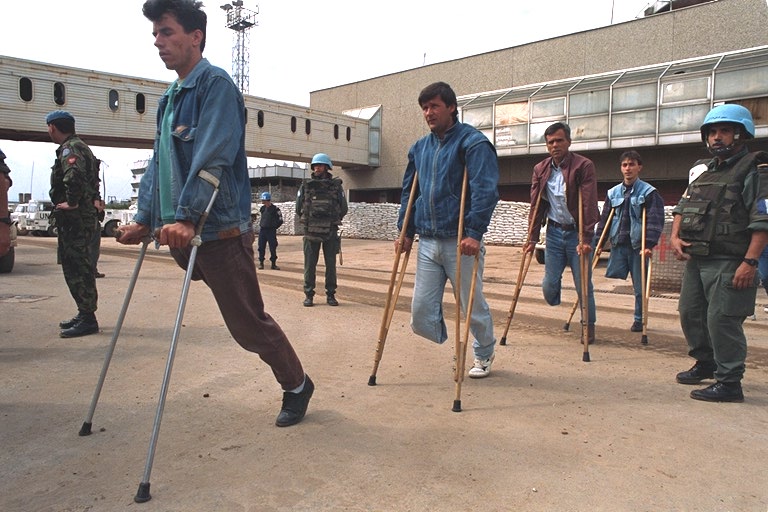
September 1994 was a very busy month in Sarajevo. Holbrooke made a fact-finding visit to the Bosnian capital while his confirmation as assistant secretary of state was pending. With him were several high-ranking U.S. diplomatic and military officials, who met separately with Bosnian army and Croat militia commanders to discuss arms shipments to the federation, according to two participants at the meeting. One participant insisted the discussion was hypothetical planning for the day when the arms embargo would be lifted. The other described how the meeting broke up in disarray when the senior U.S. diplomat, special envoy Charles Thomas, said the United States would be willing, under certain circumstances, to ship arms directly to the Bosnian Muslims. Bosnian Croat military commanders, long fearful of Bosnians receiving weapons independently, stormed out of the session, which had to be reconvened the next day to soothe concerns.
Although Holbrooke testified before the Senate Select Intelligence Committee last May that “there was never a covert action, we never considered one, not prior to my arrival in this job nor during it,” several U.S. government officials dispute that. In any case, the Bosnians believed the United States had promised them weapons assistance, and as a result President Alija Izetbegovic told the United Nations in late September 1994 that he was putting on hold for six months his request to have the arms embargo lifted. Coming from no less than the president of the beleaguered Bosnian nation, that statement undercut pressure for a unilateral lift, which had been building in Congress, and smoothed the way for a compromise amendment that averted a unilateral lift of the arms embargo. The so-called Nunn-Mitchell amendment, attached to a defense bill, prohibited U.S. enforcement of the arms embargo. Republicans believe the amendment was an administration maneuver to have Congress unwittingly approve the April 1994 “no instructions” policy turnaround.
“As part of the discussion with the Bosnians it became clear that one way to encourage them to defer their pressures for lift would be helping them get stuff even with the embargo still on,” said the senior Clinton administration official. “So Holbrooke raised the issue of should we encourage third countries to help them without orchestrating it, which would get us closer to the line of covert activity. The bottom line that both Christopher and (National Security Adviser Anthony) Lake reached was that this would get us to the point that could be seen by allies as carrying out unilateral lift by another name. It would take us that much closer to direct complicity, and it wasn’t worth the risk.”
Holbrooke testified he asked State Department lawyers in fall 1994 to study various options the U.S. could use to encourage weapons shipments to the Bosnians that would fall short of a covert operation, which would require a presidential finding and notification of Congress. A senior Bosnian government official said later Holbrooke had obviously made promises for which he didn’t yet have Washington’s backing; some Bosnian leaders felt they had been deliberately misled to win a delay on the arms embargo issue.
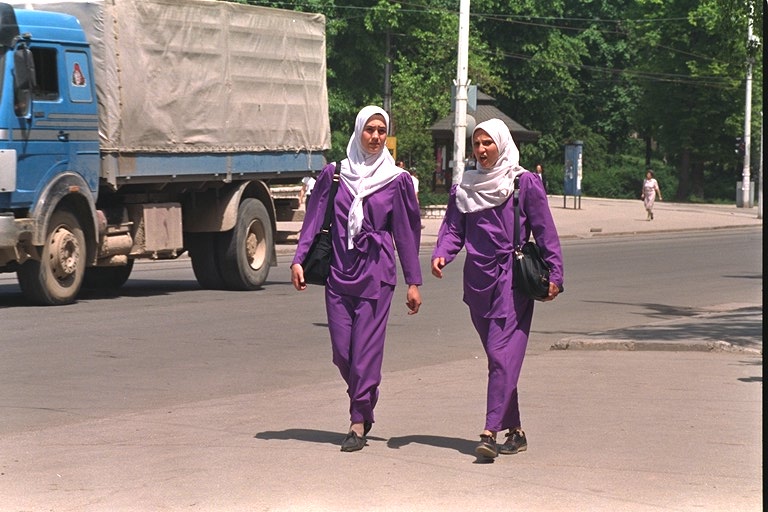
“Dick Holbrooke may have, through his body language and his enthusiasm for the idea, even though he made no promises or commitments, may have given them the sense that it was only a matter of dotting the i’s and crossing the t’s, when in fact this had to be considered at high levels and we decided not to do it,” the administration official conceded. “Expectations certainly were raised.”
In another instance that could be construed as U.S. involvement in the arms pipeline, a team of U.S. military experts flew from Germany to Zagreb in September 1995 to inspect a shipment of Iranian missiles the Croats feared had chemical warheads. The missiles didn’t, but they were not among weapons the Croats had agreed to ferry to the Bosnians, and Iran’s attempt to slip them past monitors infuriated the Croats. Nonetheless, when the CIA station chief in Zagreb later asked Susak what happened to the missiles, the Croatian defense minister replied, “We released them, just as Peter told us to do.”
Lake and Christopher, as well as some in the CIA, opposed a covert operation to arm the Bosnians, believing it could never be kept secret. Britain and France, which unlike the United States had U.N. peacekeepers in Bosnia, made clear that if the arms embargo were lifted, or the West “took sides” by arming one group over another, they would withdraw. The United States military might have to fill the ensuing vacuum if a U.N. withdrawal led to mass slaughter or starvation. In any case, U.S. troops would deploy to Bosnia under a long-standing commitment to assist in a U.N. withdrawal.
“Keeping our fingerprints off of what happened was quite important. There’s an important distinction between someone else doing it with us just looking the other way, and our encouraging countries to do it or our engaging in a direct covert operation,” the Clinton administration official said. “The approach we tookpreserved our plausible deniability. And I think it was convenient for the allies who didn’t want to pull out. Overt lift, covert lift or being confronted with direct U.S. involvement would have forced them into an untenable position.”
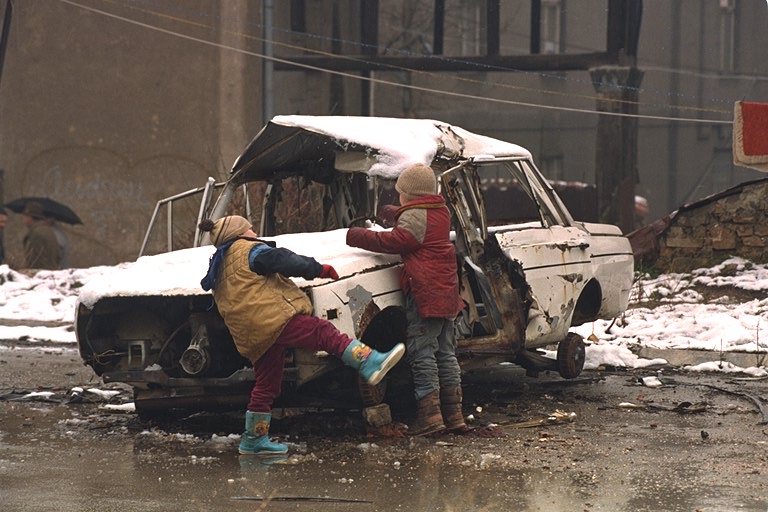
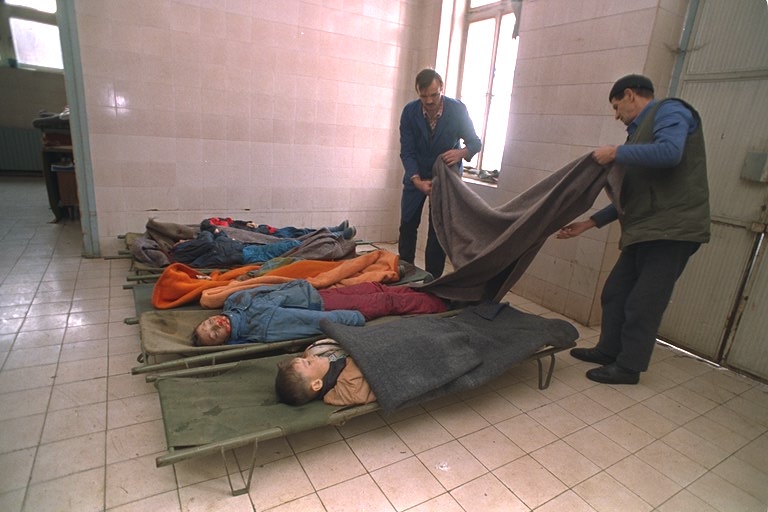
But covert activity was also ruled out because of questions about CIA capabilities, heightened by the Aldrich Ames spy scandal that broke in February 1994. Cut out of the decision-making process, the agency was left to deduce the policy change.
“All we knew was that the station chief had been asked to do something by an ambassador and that thing contradicted what seemed to be official U.S. government policy,” the intelligence source said. “Everybody in the agency had Iran-Contra staring them right in the face. The lesson they had been taught is if you startgetting instructions from NSC staffers or State Department people or anybody to do anything that comes within a country mile of covert action, a) don’t do it without a finding, and b) keep track of everything because there may be a congressional investigation.”
Then-CIA director James Woolsey, who resigned in December 1994, said in an interview that from May through October 1994 “we didn’t know whether it was a clear-cut decision by the president or some kind of backing-and-forthing between the NSC and State and the ambassador, or the ambassador pushing and people at State or the NSC reluctantly going along.” Those questions remain largely unanswered today.
Isolating the CIA ultimately led to the unraveling of the administration’s secret policy. Convinced Galbraith was engaged in questionable, if not illegal, activities, CIA officials kept tabs on who said what to whom and when. Then as U.S. troops settled into their Bosnia peace implementation duties last spring, agency sources leaked word of the policy change, determined that the CIA not be blamed for the increased Iranian presence in Bosnia or any terrorist attacks on U.S. troops that followed.
“When you dine with the devil you better have a long spoon,” said one American who was ordered out of Bosnia in the summer of 1995 after Washington learned Iranian intelligence agents were plotting to kill him. Iranian threats increased significantly in 1995, intelligence and diplomatic sources said. U.S. personnel were videotaped entering and leaving the Zagreb embassy, and the CIA station chief in Sarajevo evacuated his post shortly after arriving because of an Iranian death threat. Protective measures were instituted, including swapping old, familiar vehicles for new ones, and evacuating some non-essential personnel.
“The policy from the start was a search for ways to bring military pressure against the Serbs into the equation in order to get a better political settlement,” the administration official said.
But attempts to rally European support for a multilateral lift of the arms embargo or a greater use of NATO air power against the Serbs failed repeatedly, making the Iranian option the leastlabor-intensive way of reaching that military equilibrium.
The plan was successful in the short term. Croatians and Bosnians eventually dealt the Serbs sufficient battlefield losses that, combined with more aggressive NATO airstrikes in fall 1995, led to the Dayton peace plan. But the long term is proving difficult:
Just before the Sept. 14 Bosnian elections, U.S. troops were again alerted to a possible terrorist attack from Iranian and Iranian-backed advisors who entered Bosnia along with the arms. Two weeks later, U.S. military engineers tried to build a concrete blast barrier to protect soldiers based in downtown Sarajevo from what one officer was quoted as calling “a heavy Iranian presence.” City officials ordered it torn down. The Pentagon refused a request to discuss the threat from foreign fighters, even though it briefed regularly on the subject when U.S. troops were deploying last winter and the United States was trying to pressure the Bosnians to expel foreign fighters. Exact figures vary, but the number of Iranians in Bosnia more than doubled from a couple hundred to over 500 between early 1994 and the Dayton peace accord.
The U.S. program to equip-and-train Bosnian Muslim and Croat “federation” forces, a key element of the Dayton peace accord and considered crucial to long-term peace, has been stalled by the continuing presence of foreign fighters in Bosnia;
Though pragmatists in Sarajevo realize they cannot alienate the only remaining superpower, Iran is considered by many in the Bosnian government as the more reliable ally;
Iran’s increased influence has aided enemies of Bosnian unity, especially Croat and Serb nationalists who use the Sarajevo government’s ties to Tehran as justification for blocking a union they opposed anyway.
The administration official conceded that the U.S. position on the arms shipments “led to tacit cooperation” with the Iranian government.
“Since Daytondespite our efforts to get both the intelligence and military units out, we haven’t said throw out all the Iranians, and I think we both just accept that for the Bosnians it’s important to have the Americans behind them,” the official added. “So that we still are in a kind of tactical detente.”
Those who believe the administration’s policy was successful note it averted a collapse of the Sarajevo government and eventually forced the Serbs to talk peace, while avoiding a showdown with the Allies over lifting the arms embargo. Opponents call it short-sighted political hypocrisy of the highest order.
“The U.S. government conducted a disinformation campaign,” said one congressional critic. “Their public policy was an out-and-out falsehood given what they were doing.”
Indeed, just nine days before Galbraith delivered the “no instructions” to the Croatians, President Clinton explained why the United States was sticking with the arms embargo.
“If we ignore a United Nations embargo because we think it has no moral basis, or even any legal validity, but everyone else feels contrary, then what is to stop our United Nations allies from ignoring embargoes that we like, such as the embargo against Saddam Hussein?” Clinton told reporters in Washington. “How can we ever say again to all of the other people in the United Nations, ‘You must follow other embargoes?’ That’s a serious question for me because there are a lot of things that we want to do through the United Nations.”
©1997 Maud S. Beelman
Maud Beelman is an Associated Press foreign correspondent on leave who is researching U.S. foreign policy in the former Yugoslavia.

